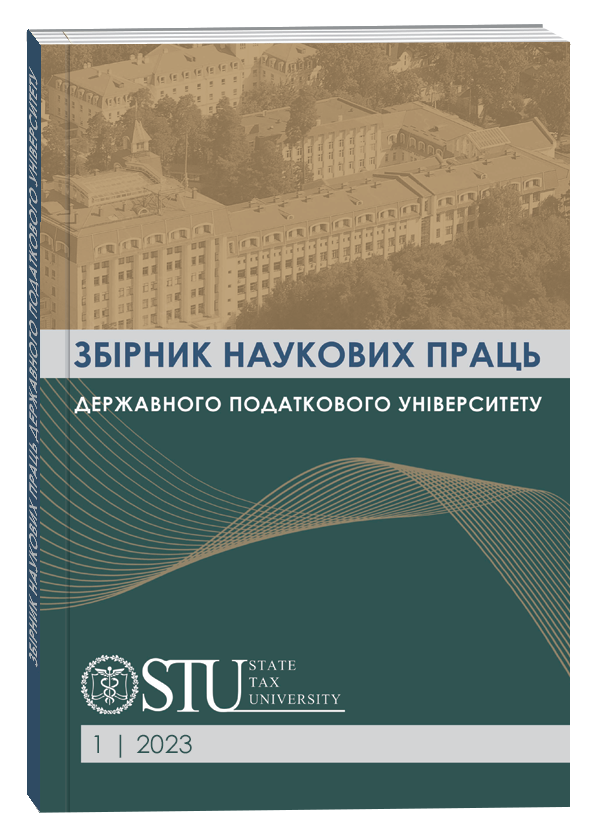IMPLEMENTATION OF ARTIFICIAL INTELLIGENCE IN THE FINANCIAL ACTIVITIES OF THE ENTERPRISE
DOI:
https://doi.org/10.33244/2617-5940.1.2023.183-198Keywords:
control, artificial intelligence, enterprise finance, financial control, managementAbstract
The article is devoted to the study of the introduction of artificial intelligence into the financial activities of the enterprise. In connection with the rapid development of technologies and the growth of data volumes, the use of artificial intelligence is becoming more and more relevant for effective financial management and the application of the latest technologies in business. The purpose of the study is to determine how the use of artificial intelligence can help in improving the financial performance of the enterprise. The research hypothesis is that the use of artificial intelligence in the financial activities of the enterprise can lead to improved efficiency and accuracy of decision-making. The article examines the main possibilities of applying artificial intelligence in the financial activities of enterprises and the advantages of using it to make managerial decisions. Research indicates that the implementation of artificial intelligence can help identify financial risks and improve the forecasting of financial indicators, as well as provide automation of accounting and analysis of financial data. To achieve this goal, a research methodology was used, which included the analysis of literary sources and conducting research based on information about the introduction of artificial intelligence into the financial activities of enterprises. Various options for the use of artificial intelligence in financial activities were analyzed, such as process automation, financial data analysis and forecasting of future results. For the successful implementation of artificial intelligence in the financial activities of the enterprise, the article suggests steps that can be taken to prepare the organization for the use of artificial intelligence. Research also points to possible shortcomings and challenges that arise when introducing artificial intelligence into the financial activities of an enterprise, so it is necessary to consider success factors and risks in the process of its implementation. Therefore, the conclusion of the study is that the use of artificial intelligence in the financial activities of the enterprise can have a significant positive impact on the efficiency and accuracy of decision-making. The study confirms the hypothesis that the use of artificial intelligence can be useful for enterprises that wish to improve their financial activities. In general, the implementation of artificial intelligence in the financial activities of an enterprise can become a key factor in successful management, but requires careful preparation and taking into account the specifics of the business.
References
Джонсон А. Вплив штучного інтелекту на фінансову діяльність підприємства. Journal of Financial Management. 2018. № 12(3). С. 45–60.
Джонс С. Використання штучного інтелекту в фінансовій діяльності підприємства. International Journal of Finance and Accounting. 2019. № 7(2). С. 23–37.
Сміт Д. Використання штучного інтелекту в фінансовому менеджменті. 2020.
Wu, G., Wang, J., Wang, Y., & Qian, Y. (2020). Machine learning in financial management: A systematic literature review. Journal of Financial Management. 2(1), 1–16.
The fourth industrial revolution, robotics, and artificial intelligence. URL : https://www.pgcareers.com/fourth-industrialrevolution
Notes from the ai frontier modeling the impact of ai on the world economy (2018). McKinsey Global Institute (MGI). С. 64.
The IEEE Global Initiative on Ethics of Autonomous and Intelligent Systems. URL : https://standards.ieee.org/industry-connections/ec/autonomoussystems.html
Агравал А., Ганс Д., Голдфарб А. Штучний інтелект на службі бізнесу. 2018. 534 с.
Foreign direct investment in the eurozone countries: stochasticity of the financial influence factors / Telnova, H., Kolodiziev, O., Krupka, I., & Boiko, N. Financial and Credit Activity-Problems of Theory and Practice. 2020. 4 (35), 107–120.
Cryptocurrency market trends and fundamental economic indicators: correlation and regression analysis / Baranovskyi O., Kuzheliev M., Zherlitsyn D., Serdyukov K., Sokyrko O. Financial and Credit Activity : Problems of Theory and Practice. 2021. № 3(38). Р. 249–261.
The impact of inflation targeting on macroeconomic indicators in Ukraine / Zherlitsyn, D., Rekunenko, I., Nechyporenko, А. & Nemsadze, G. Banks and Bank Systems. 2020. 15(2), 94–104.
Johnson, A. (2018). The impact of artificial intelligence on the financial activities of the enterprise. Journal of Financial Management, 12(3), 45–60.
Jones, S. (2019). The use of artificial intelligence in the financial activities of the enterprise. International Journal of Finance and Accounting, 7(2), 23–37.
Smith, D. (2020). Use of artificial intelligence in financial management.
Wu, G., Wang, J., Wang, Y., & Qian, Y. (2020). Machine learning in financial management: A systematic literature review. Journal of Financial Management, 2(1), 1–16.
The fourth industrial revolution, robotics, and artificial intelligence. URL : https://www.pgcareers.com/fourth-industrialrevolution
Notes from the ai frontier modeling the impact of ai on the world economy (2018). McKinsey Global Institute (MGI). С. 64.
The IEEE Global Initiative on Ethics of Autonomous and Intelligent Systems URL : https://standards.ieee.org/industry-connections/ec/autonomoussystems.html
Agrawal A., Hans D., Goldfarb A. (2018). Artificial intelligence at the service of business. 534 p.
Telnova, H., Kolodiziev, O., Krupka, I., & Boiko, N. (2020). Foreign direct investment in the eurozone countries: stochasticity of the financial influence factors. Financial and Credit Activity-Problems of Theory and Practice, 4 (35), 107–120.
Baranovskyi O., Kuzheliev M., Zherlitsyn D., Serdyukov K., Sokyrko O. (2021). Cryptocurrency market trends and fundamental economic indicators: correlation and regression analysis. Financial and Credit Activity : Problems of Theory and Practice. № 3(38). Р. 249–261.
Zherlitsyn, D., Rekunenko, I., Nechyporenko, А. & Nemsadze, G. (2020). The impact of inflation targeting on macroeconomic indicators in Ukraine. Banks and Bank Systems, 15(2), 94–104.



